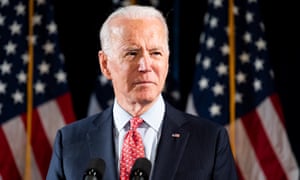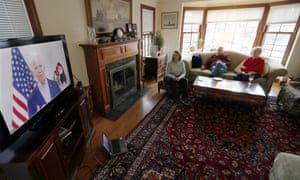#WhereIsJoe: Biden campaign tries to stay relevant amid coronavirus
The Democratic frontrunner faces an unprecedented political challenge as he seeks traction while working from home
- Coronavirus – live US updates
- Live global updates
- See all our coronavirus coverage

Photograph: Barcroft Media via Getty Images
Video conferences from a basement, glitchy internet and bouts of restlessness. Joe Biden, like the rest of America, is working from home.
The former vice-president’s confinement began abruptly on 10 March, when he touched down in Cleveland for a primary-night campaign event only to learn that the state’s governor had called for all major indoor events to be canceled as the nation slowly grasped the seriousness of the coronavirus pandemic.
That night, one of the most consequential of the Democratic primary, he delivered a victory speech from a nearly empty room in Philadelphia, near where his campaign is headquartered. It was his last traditional event on a campaign trail that has now changed beyond recognition.
Since then Biden, a retail politician who enjoys rope lines and now-forbidden handshakes, has become an unwilling pioneer in presidential campaigning in the age of the coronavirus as the pandemic has thrown the Democratic race – and all US politics – into confusion.
“There’s no playbook for what a former vice-president should be doing or saying in the middle of a global pandemic,” said the Democratic strategist Lis Smith, who helped catapult the former South Bend mayor Pete Buttigieg from obscurity to contention in the Democratic primary. “We are in uncharted waters here.”
Biden’s campaign has converted fundraising events to virtual ones and his podium is a room in his basement in his Wilmington, Delaware, home. His public appearances are usually once-a-day televised critiques of whatever Donald Trump’s administration is doing to combat the virus. His campaign has cautiously been exploring new ways to keep supporters active.
But the Democratic frontrunner is still grappling with how to adapt to the new challenges. His first live-streamed town hall, on 13 March, was hampered by audio and technical difficulties. “I’m sorry this has been such a disjointed effort here because of the connections,” Biden said, his irritation evident.
He then seemed to fade from the national stage, eclipsed by Trump’s daily White House coronavirus briefings and by governors including Andrew Cuomo, whose daily updates on the toll of the crisis in New York have become must-watch TV for many Americans.
Biden’s absence inspired the Twitter hashtag #whereisJoe, which was promoted and shared by supporters of his Democratic rival, Senator Bernie Sanders, before being picked up by the Trump campaign.
On a fundraising call last weekend, a Biden donor noted that Americans watch Trump every day at his briefings, events that his critics say increasingly resemble – in tone and length – the campaign rallies he has been forced to abandon.
“I would just love to see you more,” the donor said of the Democrat. “Like how do we get more of you and less of him on our airwaves?”
Biden assured the donor that he was raring for a comeback: his team had installed high-speed internet and built a TV studio in his basement. Soon Biden was pushing out his message. In a matter of days the question would be: where isn’t Biden?
He began the week with an address from the newly outfitted recreation room, books, a lamp and memorabilia from his decades in public life behind him. The speech was followed by back-to-back TV appearances, roundtables, a virtual happy hour with young voters, the launch of a newsletter, a podcast in the works and a CNN town hall.
The former vice-president has also enlisted an advisory board to counsel the campaign on the coronavirus that includes Ron Klain, who coordinated the Obama White House’s Ebola response. An explainer video featuring Klain and a white board has already racked up millions of views.
“The new technologies are quite effective,” Biden mused to reporters on Wednesday, noting that a recent address was not carried by the national TV networks but received 3.8m views online.
Yet even with the ramped-up online schedule, it can still be difficult for Biden to break through as he is overshadowed by other figures actually fighting on the frontlines. On Monday, he delivered his speech an hour earlier than advertised; it would otherwise have conflicted with a Cuomo press briefing. His interview with The View on Wednesday was pre-empted by another Cuomo briefing and a press conference with the Washington DC mayor, Muriel Bowser.
After serving more than 30 years in the Senate and eight years as vice-president, Biden acknowledged the difficulty of watching his former colleagues – and presidential rivals – confront the pandemic while he watched from the sidelines as a private citizen with nothing but a bully pulpit at his disposal.
“I’m chomping at the bit. I wish I were still in the Senate, you know, being able to impact on some things,” Biden told reporters on video conference press call hosted by Zoom. “But I am where I am.”
But critics still aren’t convinced that Biden is doing enough to prove that he is ready to take on Trump in November.
“I think that he needs to lead,” Larry Cohen, the chairman of the pro-Sanders Our Revolution organization, said. “He could collaborate with Bernie, who’s doing plenty, and they could lead together on an issue that unites all Democrats. It’s unimaginable to me what’s going on with him, period.”

For much of the 2020 campaign, Biden’s signature approach was to avoid unnecessary fights and press. His campaign allowed the nearly two dozen other candidates in the primary to have their moments in the sun before imploding. But now that low-key approach might work against him.
Even before the pandemic hit, Democrats worried about being able to match the Trump re-election campaign’s financial war chest. Biden, throughout the primary campaign, has been out-raised by his rivals. Campaigning from afar during a pandemic isn’t going to make raising cash any easier – especially with a team not noted for its digital prowess.
“Fundraising has been a challenge for Joe Biden since he started running for president 500 years ago,” quipped Connor Farrell, a veteran Democratic fundraiser. “This cycle in particular has been no exception. He’s been trailing his competitors throughout the primary but it’s obviously shown money isn’t everything. That being said, he does need lots and lots of money to take on Donald Trump. In particular, his online fundraising hasn’t been as good as other candidates and that’s going to become much more important now that you can’t do in-person fundraisers, where he shakes down executive and wealthy donors for checks in person.”
Farrell added that Biden “is going to have to rely on telephone calls and digital fundraising. There’s no other way around it.
“It’s not a great sign that their first fundraiser via Zoom was rescheduled due to technical difficulties,” Farrell added. “This is a skill that the campaign needs to learn yesterday for the future of the country.”
The Trump campaign has pivoted from taunting Biden over his absence on the national stage to mocking his re-emergence. An email blast from the Republican National Committee accused the former vice-president of attempting a “sorry interpretation of a president”.
Biden has been critical of Trump’s response, but he has also insisted he doesn’t want to engage Trump in a “political fight” with so much at stake for the American people.
“The coronavirus is not his fault, but the lack of speed with which to respond to it has to move much faster,” he said on The View. “This is not about Democrat or Republican. This is not about what your party is. It’s about getting through this.”
At the moment, however, Trump is enjoying the highest approval rating of his presidency, with 60% supportive of his handling of the coronavirus pandemic, according to the latest Gallup poll.
Gallup noted a “presidential rally effect” in moments of national crisis as a possible explanation.
Biden’s predicament is also complicated by the fact that he is not yet the party’s nominee. Despite consecutive weeks of victories, and an all-but insurmountable delegate lead, Sanders has shown no signs of leaving the race any time soon.
Instead, the Vermont senator has turned his campaign into a pandemic response operation, hosting expert roundtables and leveraging his vast network of donors to raise money for organizations helping to alleviate the economic impact of the crisis. And this week his campaign called for yet another Democratic primary debate.
But, with a long time to go until November, and the whole world in flux, Biden and his time still have ample time to make a difference.
Mo Eilethee, a former Democratic communications strategist and the executive director of Georgetown University’s Institute of Politics and Public Service, said offering a radically different vision of leadership during moments of national crisis was a “living, breathing example of why Biden got into the race in the first place”.
“He can use these opportunities to speak to Americans’ fears, spell out a different approach or set the record straight,” Eilethee said. “Now the real question is: how much does he seek these opportunities?”




